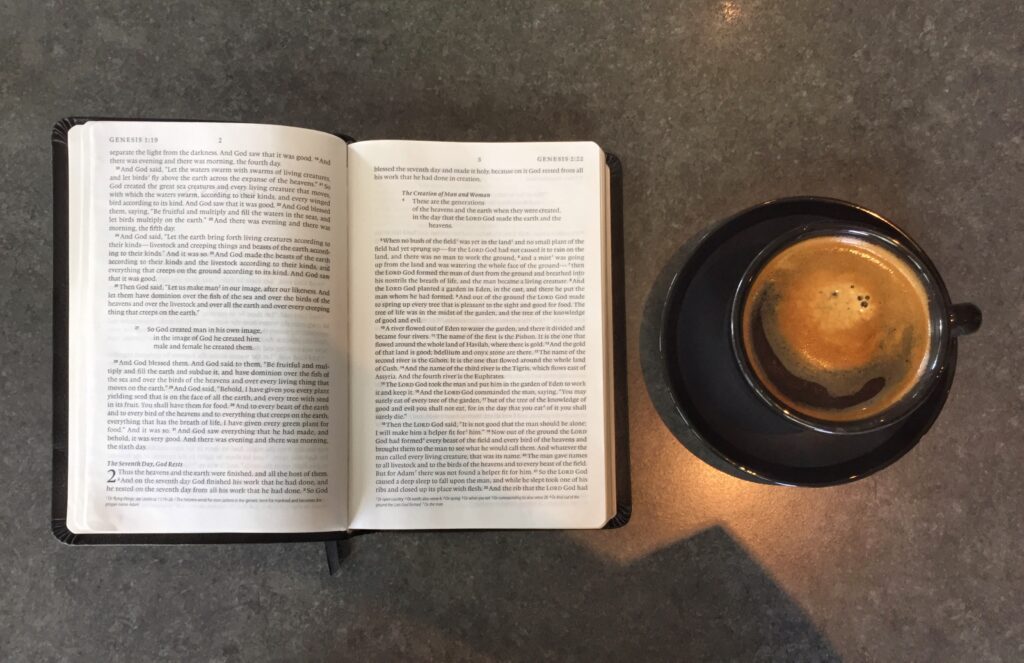A reflection on Luke 10:25-37 for Sunday, September 19, 2021 at Mosaic Baptist Church

Just then a lawyer stood up to test Jesus. ‘Teacher,’ he said, ‘what must I do to inherit eternal life?’ He said to him, ‘What is written in the law? What do you read there?’ He answered, ‘You shall love the Lord your God with all your heart, and with all your soul, and with all your strength, and with all your mind; and your neighbour as yourself.’ And he said to him, ‘You have given the right answer; do this, and you will live.’
But wanting to justify himself, he asked Jesus, ‘And who is my neighbour?’ Jesus replied, ‘A man was going down from Jerusalem to Jericho, and fell into the hands of robbers, who stripped him, beat him, and went away, leaving him half dead. Now by chance a priest was going down that road; and when he saw him, he passed by on the other side. So likewise a Levite, when he came to the place and saw him, passed by on the other side. But a Samaritan while travelling came near him; and when he saw him, he was moved with pity. He went to him and bandaged his wounds, having poured oil and wine on them. Then he put him on his own animal, brought him to an inn, and took care of him. The next day he took out two denarii, gave them to the innkeeper, and said, “Take care of him; and when I come back, I will repay you whatever more you spend.” Which of these three, do you think, was a neighbour to the man who fell into the hands of the robbers?’ He said, ‘The one who showed him mercy.’ Jesus said to him, ‘Go and do likewise.’
Luke 10:25-37 (NRSVA)
There is something dangerous – and perhaps universal – about trying to justify ourselves.
Jesus’ affirmation of the lawyer’s answer to his own question put him in a difficult situation. He affirms the call to love God with ‘heart’, ‘soul’, ‘mind’, and ‘strength’ and then your neighbour ‘as yourself’. An articulation of the heart of the Jewish law.
Yet our lawyer seems disarmed by the Jesus’ simple response: ‘You have given the right answer; do this and you will live’. It does exactly nothing to narrow this wide requirement to love. It is as broad – and confronting – as ever. Who can claim to have always loved so perfectly? So generously? So fully?
But rather than admit a shortfall our lawyer seeks a definition. He seeks fences and limits: ‘And who is my neighbour?’
The lawyer is drawn in – as with all good stories – before he knows where Jesus is leading him. After all, Jesus has no intention of answering this question.
Our parable opens with a naked, beaten, and ‘half-dead’ traveller. Clothes may give an inkling of culture or class. Given his condition – and his silence throughout the story – Jesus drops no hint at an identity through language or accent. The scene is set: a man is in need on a dangerous road. We know nothing more.
This anonymity is lost on neither Levite nor priest. Both respond in exactly the same way: they ‘saw him’ and ‘passed by on the other side’. They fear one so completely unknown.
But Jesus places another character on this road. After the passing of the honored and respectable, a ‘Samaritan’ takes centre stage. It is a shocking development. This half-cast race – neither Jew nor gentile – may have been the most despised of all.
But it is this man who is ‘moved with pity’. He shares. Gives. Cares. He places himself in danger. Any plans are put on hold. It costs two day’s wages – plus whatever additional charges this innkeeper may choose.
By any standard his is an act of extravagant generosity.
And only now does Jesus request the lawyer’s judgment: “Which of these three, do you think, was a neighbour to the man who fell into the hands of robbers?’ The obvious answer is: ‘The Samaritan’. The given one: ‘The one who showed him mercy’. It is like our lawyer avoids even speaking the name of this race.
He has, however, understood.
Jesus does not define, as requested, who is validly considered a neighbour. He simply defines the actions of one who is a generous – even loving – neighbour. It is not about the recipient. It is about the giver.
And it is all, alarmingly, couched in a Jesus-constructed story that makes a hero out of one towards whom hatred had been justified. Our lawyer must have wondered where it all went wrong.
After all it started with the simplest of questions: ‘Teacher, what must I do the inherit eternal life?’
Conversation Starters:
Have you ever experienced a good neighbour? What was it like? Have you ever been a good neighbour? What was this like?
Why do you think the lawyer wanted to narrow the definition of ‘neighbour’? In what ways are you tempted to do the same?